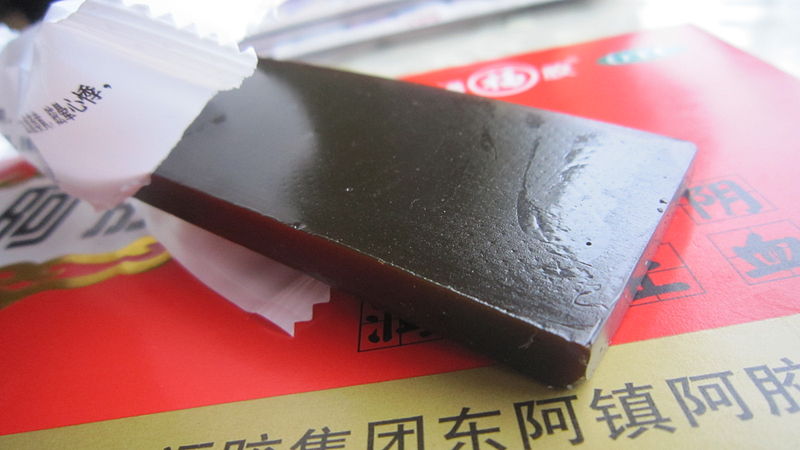
Over the last three years the donkeys in Africa have been decimated. The extermination of quadrupeds of burden stems from growing Chinese demand for their skin, which boiled and converted into gelatine, is the primary ingredient in the preparation of an ancient remedy:ejiao (ACC; donkey glue), which according to traditional Chinese medicine improves blood circulation and cures headaches, insomnia, dizziness, bleeding and dry coughs, as well as having anti-ageing properties.
The use of Ejiao dates back some two thousand years, when its benefits were the exclusive preserve of the imperial family, while today it is extended to members of China’s burgeoning middle class.
The Daily Mail Online attributes ejiao’s manic popularity to a potent mix of snobbery, superstition and state propaganda, and tells how the mythology surrounding the elixir requires that the donkey skins are only boiled during the winter months. Based on this belief, the most effective ejiao is prepared during the Dongzhi Festival.
The mixture prepared in these days is the one that achieves the highest price in the market, so much so that a finger of 8.8 ounces of cereal-infused ejiao can cost more than 3 thousand euros.
No wonder that after having decimated China’s donkeys population, local pharmaceutical industries seeking to produce sufficient amounts of ejiao have turned their attention to Africa, where donkeys are still in excellent health.
Demand for donkeys skins in the region has risen at a phenomenal rate, so much so that in recent months, Burkina Faso, Niger and Nigeria have banned exports of donkey skins. However, after the export block in the three countries, animal welfare organizations have complained that the breeding and illegal slaughter of donkeys has increased exponentially in Africa.
In South Africa, the increase in demand for donkeys has caused a rash of thefts and cruelty to these animals. To curb the phenomenon, Pretoria has adopted a drastic downsizing of farms, but in the “rainbow nation” numerous incidents of violence were recorded against the unfortunate equids, the last of which dates from the end of January, when police discovered an illegal slaughterhouse in Benoni, a town situated in the province of Gauteng.
The discovery came after the South African National Society for the Prevention of Cruelty to Animals (NSPCA) identified another slaughterhouse for donkeys in Olifantshoek, in the Northern Cape. In the latter place, evidence of the horrors perpetrated on animals have been found, supported by documentation that establishes like donkeys were mistreated, bludgeoned to death and in some cases skinned alive.
Last November, one of the Highveld Horse Care Unit managers, Nadia Saunderson, who through the Donkey Project conducts investigations of complaints of cruelty towards donkeys, raised the alarm about the slaughter of these animals in African rural communities, comparing it to the trade of poaching ivory extracted from rhinoceros horn.
The consequences of this huge business, were carefully considered in the new report Under the skin. The emerging trade in donkey skins and its implications for donkey welfare and livelihoods, published last week by the Donkey Sanctuary. As the title suggests, the South African animal welfare NGO’s study denounces the potential effects and implications of the growing trade in donkey skin.
The report highlights the recent development of cooperation between African governments and China, which has helped make China the first trading partner of sub-Saharan Africa and significantly increased African exports to the Asian giant.
An assumption that has encouraged the export of donkey skins aimed at food and ejiao production for the Chinese market. The Donkey Sanctuary report notes that practically all African countries with significant donkey populations have experienced a substantial increase in the slaughtering of donkeys.
A donkey skin can be sold for between 20 and 500 Euros, so a container full of skins can yield over half a million euros, equivalent to about 7 million 200 thousand South African rand.
The trade of products derived from donkeys is legal in Namibia, Botswana, Tanzania and Kenya. Ethiopia is the African nation withthe most significant population of donkeys, estimated at 7.4 million copies.
In Ethiopia, in the Horn of Africa, two donkey slaughterhouses have been realized in Debre Zeit (Bishoftu) and Asela towns, although neither of these plants is still in operation.
Experts from the Donkey Sanctuary consider that it is very likely that in the long-term the trade in donkey skins with China can create social and economic damage in Ethiopia, where 83% of the population resides in rural areas and transport of raw materials is mainly on the rump of donkeys.
@afrofocus
Over the last three years the donkeys in Africa have been decimated. The extermination of quadrupeds of burden stems from growing Chinese demand for their skin, which boiled and converted into gelatine, is the primary ingredient in the preparation of an ancient remedy:ejiao (ACC; donkey glue), which according to traditional Chinese medicine improves blood circulation and cures headaches, insomnia, dizziness, bleeding and dry coughs, as well as having anti-ageing properties.



